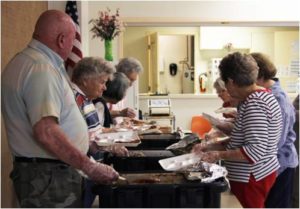(This post is one in a series on race titled “But Some of Us Are Brave.” The series includes posts from a diverse group of writers from our community. It takes a considerable amount of transparency and vulnerability for the contributors to this series to pen these posts and voice their experiences. We appreciate their courage, and we hope their willingness to be brave will spark some authentic community conversation on this sensitive and important topic. We hope you will read these posts thoughtfully and join the conversation by responding honestly and respectfully, and by sharing them with your friends and acquaintances. — ABT )
By Kelsey Miller
I want to recognize the great work Lucas did in his post in this series by echoing his confession: I am racist. We all are. I say this in a spirit of deep repentance, which is where any truthful conversation about race must begin. This beginning also protects us from the dangerous temptation to think that we will somehow transform our culture into a utopia where we will each transcend racism and become color-blind. Better instead to accept and find meaning in the challenge of the work of un-packing our own biases, conscious and subconscious. That is good and fruitful work that we might all dive into together for a lifetime.
I grew up outside Chicago in a very white, very privileged suburb. It was not until I moved to Texas that I first heard a blatantly racist comment, spoken by one white person to another. The naïve temptation in that moment was to believe that somehow, the more highly evolved North was devoid of racism, while the South is filled with it. With more exposure, I soon learned that racism is not a geographical problem or cultural problem; it’s a human problem. Still, in the last few years that I’ve lived in Texas, I am sobered by the number of times I can recall where I said nothing in reply to both explicitly and implicitly racist comments.
One tool that has helped me to analyze some of these comments and attitudes, and to continue questioning my own stereotypes and biases, is to read books and articles by African American authors who are critically engaging issues of race, power, and privilege in our culture. I am deep into Bryan Stevenson’s new book Just Mercy, and I believe his prophetic witness to the deep brokenness in our criminal justice system in the form of racial and socioeconomic disproportionality is changing me permanently.
Stevenson writes, “Today we have the highest rate of incarceration in the world. The prison population has increased from 300,000 people in the early 1970s to 2.3 million people today…One in every fifteen people born in the United States in 2001 is expected to go to jail or prison; one in every three black male babies born in this century is expected to be incarcerated.”
Stevenson goes on, “Some states permanently strip people with criminal convictions of the right to vote; as a result, in several Southern states disenfranchisement among African American men has reached levels unseen since before the Voting Rights Act of 1965.”
If you did not already know this, does it surprise you? I am shocked by the statistics and stories Stevenson shares in this book. Stories of systemized violence against people of color, of intentional legal misrepresentation of African American clients, of scores and scores of laws in our country that are less than 50 years dead that routinized and systemized the inferior status and treatment of people of color. I can own up to the fact that it is a privilege to be shocked, but I hope never to stop there. It is only when you and I use that shock to fuel us to keep reading, to keep listening, and to keep having the hard conversations that it becomes truly valuable.
Stevenson’s work has empowered me to engage more critically and respond more vocally to daily instances and examples of the dangerously disproportionate systems he unpacks. For white people, this means first confessing our own participation in racism, even if we think it only happens inside our own heads, and then resisting the urge to remain silent when other white people make openly or implicitly racist remarks. I used to think that it wasn’t worth risking a relationship or upsetting a temporary calm to call out wrong when I heard it. And I doubted my own strength, or that a few comments from me on the destructive nature of racism could be effective. How often do I tell myself that lie? That people can’t change or won’t understand, and it’s better for me to just be quiet?
Perhaps the more sobering question is this: is false harmony more valuable than the everyday pursuit of equality and justice?
A switch flipped when I realized that I can choose to either sell out people of color by refusing to openly condemn racism when I see it in action, or I can summon the courage to say something when it would be easier to be quiet. I’ll admit that this understanding of “bravery” is really lame and cheap in the wake of protestors who took to the streets of Selma, the bus boycotters who endured beatings and abuses, the unjustly tried and accused who faced all-white juries presented with zero evidence, followers of Dr. King and Malcolm X who were willing to give their all so that they might be heard, and so many more. Still, my voice is what I have, and speaking up is one thing I can do. So rather than be immobilized by the weight of my privilege and frustration, I can choose to say something. I can decide that false harmony is not more valuable than the everyday pursuit of equality and justice. I can risk the hurt feelings or shock of neighbors, colleagues, family, and friends when I tell them that comment they just made was NOT ok (and why).
And, since I started this post with a confession, I’ll end it with one: I am pretty terrible at being brave, most especially about a topic as challenging and uncomfortable as racism. But I’m trying, and I’m working on it, and I’m learning from people who are much braver and wiser than I am.
Will you join me? How can we be brave together today?
 Kelsey Miller is a Child Hunger Outreach Specialist at Texas Hunger Initiative’s Waco Regional Office. She is passionate about more people gaining access to and education about healthy foods and our food system, and thinks the expertise of those experiencing hunger and poverty should always be our starting point. Kelsey lives with her husband and rambunctious puppy in Waco, and is also pursuing an MSW from Baylor part-time.
Kelsey Miller is a Child Hunger Outreach Specialist at Texas Hunger Initiative’s Waco Regional Office. She is passionate about more people gaining access to and education about healthy foods and our food system, and thinks the expertise of those experiencing hunger and poverty should always be our starting point. Kelsey lives with her husband and rambunctious puppy in Waco, and is also pursuing an MSW from Baylor part-time.
(This post is one in a series on race titled “But Some of Us Are Brave.” The series includes posts from a diverse group of writers from our community. It takes a considerable amount of transparency and vulnerability for the contributors to this series to pen these posts and voice their experiences. We appreciate their courage, and we hope their willingness to be brave will spark some authentic community conversation on this sensitive and important topic. We hope you will read these posts thoughtfully and join the conversation by responding honestly and respectfully, and by sharing them with your friends and acquaintances. — ABT )
A Bad Day – By Shamethia Webb
She was having a bad day.
And what exacerbated it was the fact that it wasn’t unusual.
She awoke on time (which meant early for her). Showered. Brushed her teeth. Scowled at herself in the mirror. And went to work.
All of her co-workers were talking about the black boy who was murdered while walking from a convenience store. They’d been talking about it for days. Talking about it and doing nothing. The same words again and again as if the incessant movement of their mouths negated a seventeen year old corpse.
She hated them.
During her break she washed and rewashed her hands in the restroom. She abhorred being in the ladies room for longer than a few minutes. It smelled like women. Which meant it smelled like pain and fatigue.
She wrenched a paper towel out of the dispenser and cast a frown at the vacant stalls that seemed to mock her loneliness.
She was tired.
She didn’t speak during staff meeting. Didn’t see the point in disturbing her tongue. They always smiled over her suggestions. Or tasted her words with their mouths before spitting them out. It infuriated her. Mostly it hollowed her. Cleaved into her like a perforated knife and emptied her out.
She’d spilled so much of herself over these hallways during her tenure here. Specks of herself all over the walls. Now a permanent grimace clung to her face like love.
The smell of coffee hung in the air. Stale. A room full of spit and disdain. She inhaled. Yes, disdain. She could smell it on them like second skin.
They were talking about him again. Her boss didn’t use the word murder. But defense. And mistake. And misunderstanding.
She hated him.
Her co-worker, the one with a frown for a smile, giggled at her boss’s comment that the black boy should have ducked the bullets.
I thought black boys were fast, he joked. A room full of laughter.
She died a little bit.
But not enough. She still had to clock out. And smile at the receptionist who always mispronounced her name. She still had to leave the building—and them, and them—with as much of herself intact as possible.
She stumbled to her car, trembling in her black woman fury.
She was tired.
In the checkout line at the supermarket, she watched as her few items moved lazily up the conveyor belt. The cashier chatted animatedly with the customer in front of her.
Don’t let this cashier cut her eyes at me, she thought to herself. Not today.
Don’t let her reach for my money with two fingers as if she’s afraid of skin contact. Don’t let her suddenly become mute and unresponsive to my presence, to my human being-ness. Don’t let her. Not today.
She realized with some panic that it wasn’t anger that fueled her thoughts but despair. She recognized that if the cashier did de-humanize her today she wouldn’t respond with fury but with resignation.
The passivity worried her.
I’m dying too fast, she thought.
She tensed as her items moved closer to the cashier, and she couldn’t help but notice that the murdered boy’s eyes stared back from every magazine in the aisle.
The repetition overwhelmed her. She shook.
Pieces of herself broke off. Landed dully on the laminate floor.
She tried to remember her breath. And forget her boss and the restroom stalls and the hundreds of cashiers who’d humiliated her and the tiptoeing gunman and the black corpse and the black corpses theblackcorpsestheblackcorpsestheblackcorpsetheblacktheblacktheblackblackblack
She tried to catch herself but her hands were already gone. Dead.
. . .
I hate soap operas.
A voice behind her.
She opened her eyes. When had she closed them?
A white man behind her scowled at a TV guide featuring frozen celebrities. He turned a full smile on her. The white of his teeth blinding for a moment.
Don’t you just hate soap operas?
She managed a nod.
She did hate them. This aisle was full of things she hated. This city. This world. Full of things she hated. Or perhaps just full of things (No. People, she amended. She liked being correct). Full of people who hated her.
I’d rather read the back of a cereal box than watch TV, the man said.
He picked up one of his boxes of cereal and waved it at her.
This isn’t food but entertainment.
She smiled. Not a full one (she was incapable of that at this point) but a slash of the mouth that surprised her with its suddenness.
. . .
And there was a pocket of time when he wasn’t who he was or had to be and she wasn’t who she was or had to be. They just were.
And there was a glimmer inside of her. Something not quite dead, that stirred.
The cashier was aloof but polite. And that was enough.
She walked to her car without the usual trembling.
The white man (No, man, she corrected) was parked beside her. They chatted as they loaded their items into their cars.
Well, he chatted. She managed to listen without the usual weariness and rage.
Perhaps she would sleep in tomorrow.
Yes.
Perhaps she would grow again.
And as she slid into her driver’s seat, a murmur of a smile across her face, the man waved a crumbled bill in her face and propositioned her for sex.
 Shamethia Webb (on the right in the picture) is the Regional Director of the Texas Hunger Initiative Waco Regional Office. She grew up in Waco and spends her free time writing, dreaming, and trying to protect her reign as Connect Four Champion from her nephews. Hip hop music, sour candy, and Toni Morrison novels are a few of her favorite things.
Shamethia Webb (on the right in the picture) is the Regional Director of the Texas Hunger Initiative Waco Regional Office. She grew up in Waco and spends her free time writing, dreaming, and trying to protect her reign as Connect Four Champion from her nephews. Hip hop music, sour candy, and Toni Morrison novels are a few of her favorite things.
by Jadi Chapman, Texas Hunger Initiative
If I were greeted everywhere the same way I am greeted when I walk through the doors of Harrison Senior Center life would be a joy. As I enter the senior center every week I am greeted with warmth, love, and a lot of hugs. I sit and talk with the senior citizens as they eat their lunch provided by Meals on Wheels. Every senior wants to tell me his or her story. They want to impart the wisdom they have gained from the Great Depression, the Great Wars, and illnesses that have befallen them and their loved ones. There are countless years of experience in the room, but as a senior shared with me, very few people want to listen to the knowledge gained from those experiences.
In most cultures the elderly are revered and respected. In Asian countries it is of the utmost importance to be respectful and to celebrate the elderly. In Latin culture it is commonplace for many generations to live together under one roof. The United States, however, is very youth-centric.
I had never really thought about issues that older Americans face. They gradually lose their independence as their health begins to fail and the symptoms of getting older set in. As I have gotten to speak with seniors over the past few months I have learned to admire and respect the beauty of aging. The seniors I spoke with are all so grateful and positive for what they have and the life they have lived.
 There doesn’t seem to be as much discussion or action around senior issues as there is around other social issues. It is hard to get people to rally around the aging population; people don’t see them as our future but as our past. Hunger among older Americans is something that can be forgotten when addressing food insecurity in the United States. Meals on Wheels serves 15 percent of the over half a million food insecure seniors in Texas. This leaves a substantial number of seniors wondering where their next meal will come from.
There doesn’t seem to be as much discussion or action around senior issues as there is around other social issues. It is hard to get people to rally around the aging population; people don’t see them as our future but as our past. Hunger among older Americans is something that can be forgotten when addressing food insecurity in the United States. Meals on Wheels serves 15 percent of the over half a million food insecure seniors in Texas. This leaves a substantial number of seniors wondering where their next meal will come from.
Because so many factors come into play when attempting to address senior hunger, it is an issue that is better addressed holistically. Some of these factors include:
- Financial insecurity
- Lack of transportation
- Special dietary needs
- Mental illness
Food insecurity among seniors is not simply a matter of not being able to afford to buy food. Sometimes seniors require specialized diets that are difficult to follow on a limited income. Metabolic illnesses, such as diabetes, impact what seniors are able to eat. Large supermarkets can also prove quite taxing for seniors. It takes a lot of energy to walk all over a large, crowded store when suffering from ailments such as arthritis, respiratory problems, or knee and hip replacements.
Alzheimer’s and Dementia can also have an impact on a senior’s nutrition. They may just forget to eat. Even if they have meals delivered, they may put the food in the fridge and then forget it is there. Many times the people who care for people with Alzheimer’s and dementia are seniors themselves. Sometimes these caretakers are so focused on the needs of the patient that they tend to neglect their own nutritional needs. When tackling senior hunger, it is important to approach the issue holistically. Mental, physical and emotional needs must be met in order to increase a senior person’s quality of life.
We were taught to respect our elders and look to them for wisdom, but American society tends to focus on our future instead of looking at our past to guide our future. May is Older Americans Month. Find a way to support the seniors in your community by donating your time to Meals and Wheels or Friends for Life, or by simply by helping the seniors in your community.
 This Act Locally blog post is by Jadi Chapman. She is a Field Organizer at Texas Hunger Initiative’s Waco Regional Office. Her focus is on issues facing seniors accessing food in the Waco community. If you would be interested in writing for the Act Locally Waco blog, please contact [email protected].
This Act Locally blog post is by Jadi Chapman. She is a Field Organizer at Texas Hunger Initiative’s Waco Regional Office. Her focus is on issues facing seniors accessing food in the Waco community. If you would be interested in writing for the Act Locally Waco blog, please contact [email protected].
.
